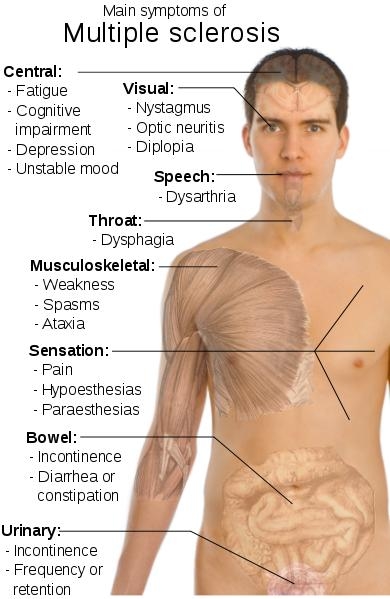Table of Contents
 An autoimmune disease, where the central nervous system and brain gets majorily affected, is called as multiple sclerosis (MS). It causes damage to myelin sheath that protects the neurons. This damage may occur due to inflammation of optic nerve, brain or spinal cord, which disrupts nerve signals that may become slower or completely stop down.
An autoimmune disease, where the central nervous system and brain gets majorily affected, is called as multiple sclerosis (MS). It causes damage to myelin sheath that protects the neurons. This damage may occur due to inflammation of optic nerve, brain or spinal cord, which disrupts nerve signals that may become slower or completely stop down.
Multiple sclerosis occurs more in women than men, and is commonly observed in population of ages 20 and 40, though, it may occur at any age. The exact cause of MS is not known, but it is assumed to be caused due to some gene defect or a virus infection or both, at times. People having family history of the disease; tend to be affected more profoundly.
Importantly Observed Symptoms Of Multiple Sclerosis
Multiple Sclerosis symptoms may vary, depending on the severity and position of damage that has occurred. Sometimes, there may not be any symptoms or reduced symptoms in contrast to other days that show constant symptoms. The disease may relapse or may continue to be worse with varied symptomatic signs.
Symptoms may occur, pertaining to different parts of the body, since, nerves of spinal cord or brain are being damaged that inturn affect various nerve signals. Sun exposure, hot baths, stress or fever are possible triggers that worsen the condition.
Physical Signs Of Multiple Sclerosis
Mobility Issues
Multiple sclerosis patients show difficulties in being mobile like walking, bed movements or shifting from one place to another. After many years of MS, most patients need to use a unilateral walking support. Patients suffer from extreme weakness, impaired balance, tremor, low strain tolerance, fatigue and hyper tonicity.
MS patients may need to depend on wheelchairs, motorized vehicles or walking aids depending on the extent of reduced mobility and the level of disability occurred.
Ataxia And Tremor
Unintentional, repetitive and rhythmic muscle movement, with oscillations of one or more body parts is referred as tremor, observed most commonly as part of involuntary movements in MS patients. It may affect head, hands, face, arms, trunk, vocal chords or legs.
On other hand, Ataxia is a clumsy and an unsteady movement of torso or limbs that occur due to failure of gross muscular co-ordination. Muscular control failure is observed in legs and arms of patients with MS, resulting in loss of co-ordination or disturbance of locomotion. Ataxia and tremor are amongst the frequent symptoms of MS, present in around 25 to 60% of the patients. These disabilities are the cause of embarrassment and low self esteem, amongst the individuals having them.
Cognitive Changes During Ms
The most common affect of MS is associated with cognitive problems, like loss of attention, memory, visual spatial abilities and processing speed. Neurological Fatigue and emotional instability are also signs of cognitive changes, occurring frequently in the patients. Cognitive impairment is observed in around 40 to 60% of MS patients. Dementia is a rare symptom that may occur only in 5% of the patients.
Clinical depression remains the most common sign of neuropsychiatric condition, and cases of lifetime depression show prevalence of 40 -50% in MS patients. Additionally, anxiety, anger, hopelessness, frustration or suicidal tendency remains a very serious threat that causes death of 15% of MS sufferers.
Also Read
Multiple sclerosis cure with herbs
Multiple Sclerosis Treatment with Proper Diet
How to Relieve Multiple Sclerosis Symptoms with Non Medical Treatments
How To Treat Multiple Sclerosis With Natural Remedies
Visual Abnormalities Observed In Ms Patients
Multiple sclerosis patients undergo brain stem disruption, causing internuclear ophthalmoplegia, where internal communication between both the eyes gets affected. This inturn, results in failure of medial rectal muscle to contract normally and hence, eyes could not move equally, leading to disconjugate gaze.
Diplopia is the double vision that occurs during multiple sclerosis, where the conjugate lateral gaze gets disrupted.Rapid onset of pain is experienced in one eye of the patients leading to blurred vision. Inflammation and destruction of myelin sheath of optic nerves may also lead to vision loss.
Sexual Problems In Ms Patients
Diagnosis of multiple sclerosis also report sexual dysfunction in large number of patients.
Sexual dysfunction in men includes ejaculatory and erectile problems, with prevalence of 75 to 90% in MS patients. Erectile dysfunction is known to be one of the most occurring sexual dysfunction, in MS patients.
Various Bladder Problems
70 to 80% of individuals with multiple sclerosis tend to have bladder problems due to high levels of mobility problems and co-ordination issues that may disorient their hygiene habits. The most common of all remains urinary incontinence, frequent urination, leaking and retention. Retention of urine further may lead to urinary tract infections.
Currently, there is no reported cure for multiple sclerosis but there exist specific therapies to slow down progression of the disease. The treatment goal is to reduce symptoms so that multiple sclerosis patients can maintain a normal and quality life.
Photo Credit: http://www.wellstreet.com/news/symptoms-multiple-sclerosis-atlanta/
Caution: Please use Home Remedies after Proper Research and Guidance. You accept that you are following any advice at your own risk and will properly research or consult healthcare professional.



